中考英语知识点:介词in的常见用法
- 格式:doc
- 大小:24.50 KB
- 文档页数:3
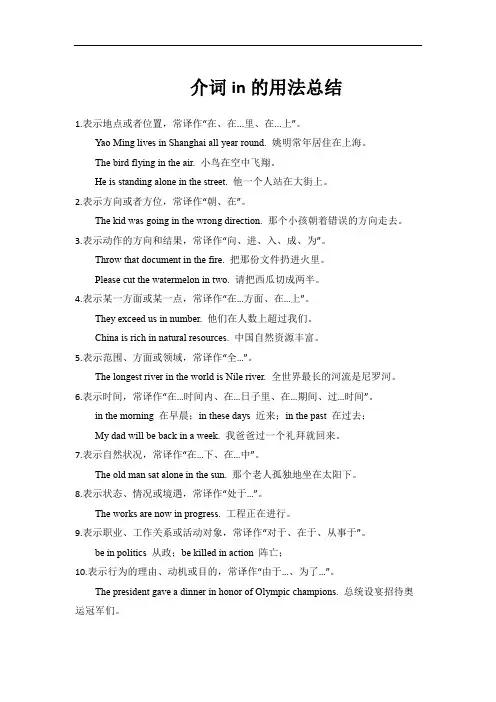
介词in的用法总结1.表示地点或者位置,常译作“在、在...里、在...上”。
Yao Ming lives in Shanghai all year round. 姚明常年居住在上海。
The bird flying in the air. 小鸟在空中飞翔。
He is standing alone in the street. 他一个人站在大街上。
2.表示方向或者方位,常译作“朝、在”。
The kid was going in the wrong direction. 那个小孩朝着错误的方向走去。
3.表示动作的方向和结果,常译作“向、进、入、成、为”。
Throw that document in the fire. 把那份文件扔进火里。
Please cut the watermelon in two. 请把西瓜切成两半。
4.表示某一方面或某一点,常译作“在…方面、在…上”。
They exceed us in number. 他们在人数上超过我们。
China is rich in natural resources. 中国自然资源丰富。
5.表示范围、方面或领域,常译作“全…”。
The longest river in the world is Nile river. 全世界最长的河流是尼罗河。
6.表示时间,常译作“在…时间内、在…日子里、在…期间、过…时间”。
in the morning 在早晨;in these days 近来;in the past 在过去;My dad will be back in a week. 我爸爸过一个礼拜就回来。
7.表示自然状况,常译作“在…下、在…中”。
The old man sat alone in the sun. 那个老人孤独地坐在太阳下。
8.表示状态、情况或境遇,常译作“处于…”。
The works are now in progress. 工程正在进行。
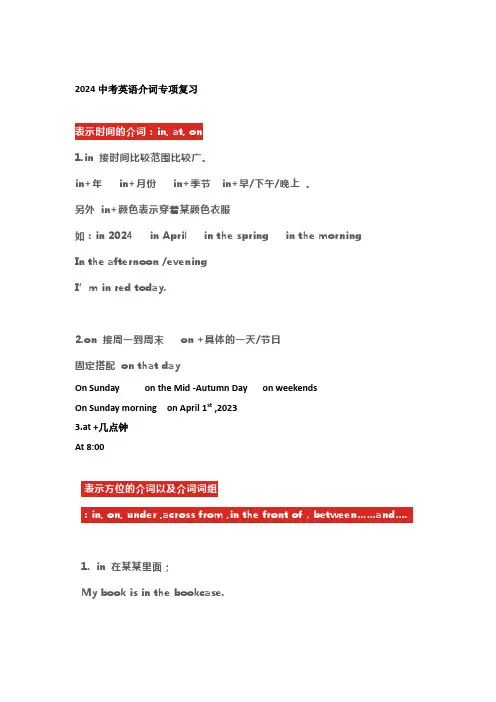
2024中考英语介词专项复习表示时间的介词:in, at, on1.in 接时间比较范围比较广。
in+年in+月份in+季节in+早/下午/晚上。
另外in+颜色表示穿着某颜色衣服如:in 2024 in April in the spring in the morningIn the afternoon /eveningI’m in red today.2.on 接周一到周末on +具体的一天/节日固定搭配on that dayOn Sunday on the Mid -Autumn Day on weekendsOn Sunday morning on April 1st ,20233.at +几点钟At 8:00表示方位的介词以及介词词组:in, on, under ,across from ,in the front of,between……and….1.in 在某某里面;My book is in the bookcase.in 表示在某地范围之内。
Shanghai is/lies in the east of China. 上海在中国的东部。
3.on 表示在某某上面。
There are many books on the table.4.under 在某某下面。
There is a ball under the chair.5.across from 在某某正对面。
There is park across from my home.6.in front of 在某某的前面。
There is a tree in front of my house.7.betwee n……and……..在两者之间There is a zoo between the park and the school.介词:at, for, by1. at “以……价格”。
I sold my car at a high price.2. for 表示“用……交换,以……为代价”。
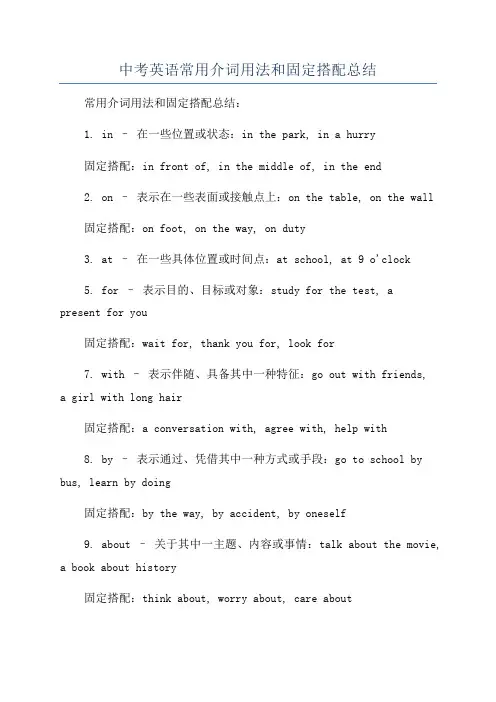
中考英语常用介词用法和固定搭配总结常用介词用法和固定搭配总结:1. in –在一些位置或状态:in the park, in a hurry固定搭配:in front of, in the middle of, in the end2. on –表示在一些表面或接触点上:on the table, on the wall固定搭配:on foot, on the way, on duty3. at –在一些具体位置或时间点:at school, at 9 o'clock5. for –表示目的、目标或对象:study for the test, apresent for you固定搭配:wait for, thank you for, look for7. with –表示伴随、具备其中一种特征:go out with friends,a girl with long hair固定搭配:a conversation with, agree with, help with8. by –表示通过、凭借其中一种方式或手段:go to school by bus, learn by doing固定搭配:by the way, by accident, by oneself9. about –关于其中一主题、内容或事情:talk about the movie,a book about history固定搭配:think about, worry about, care about10. for –表示计划或安排事:get ready for the exam, prepare for a trip固定搭配:study for, wait for, ask for11. with –用于描述其中一种状态或情况:be happy with the result, be busy with work固定搭配:satisfied with, familiar with, pleased with12. about –表示具体细节或内容:talk about your trip, a movie about love固定搭配:worry about, think about, care about这些是常用的英语介词用法和一些固定搭配,但在实际运用中还需根据具体语境选择合适的介词。
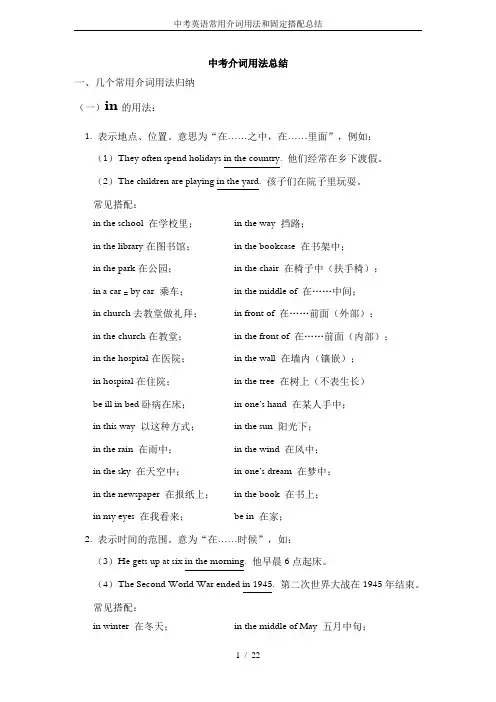
中考介词用法总结一、几个常用介词用法归纳(一)in的用法:1. 表示地点、位置。
意思为“在……之中,在……里面”,例如:(1)They often spend holidays in the country. 他们经常在乡下渡假。
(2)The children are playing in the yard. 孩子们在院子里玩耍。
常见搭配:in the school 在学校里;in the way 挡路;in the library在图书馆;in the bookcase 在书架中;in the park在公园;in the chair 在椅子中(扶手椅);in a car = by car 乘车;in the middle of 在……中间;in church去教堂做礼拜;in front of 在……前面(外部);in the church在教堂;in the front of 在……前面(内部);in the hospital在医院;in the wall 在墙内(镶嵌);in hospital在住院;in the tree 在树上(不表生长)be ill in bed卧病在床;in one’s hand 在某人手中;in this way 以这种方式;in the sun 阳光下;in the rain 在雨中;in the wind 在风中;in the sky 在天空中;in one’s dream 在梦中;in the newspaper 在报纸上;in the book 在书上;in my eyes 在我看来;be in 在家;2. 表示时间的范围。
意为“在……时候”,如:(3)He gets up at six in the morning. 他早晨6点起床。
(4)The Second World War ended in 1945. 第二次世界大战在1945年结束。
常见搭配:in winter 在冬天;in the middle of May 五月中旬;in the end 最后;in the future 在将来;in the past 在过去;in the middle of the day 在中午;in/over the last/past ten years在过去的十年中;3. 表示时间的经过。
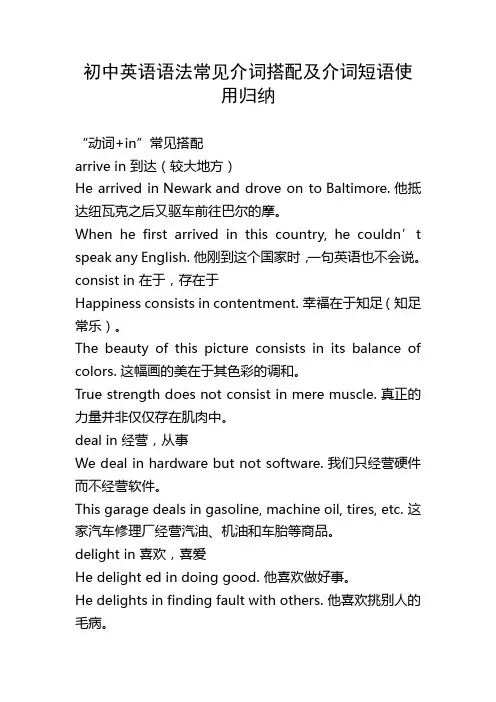
初中英语语法常见介词搭配及介词短语使用归纳“动词+in”常见搭配arrive in 到达(较大地方)He arrived in Newark and drove on to Baltimore. 他抵达纽瓦克之后又驱车前往巴尔的摩。
When he first arrived in this country, he couldn’t speak any English. 他刚到这个国家时,一句英语也不会说。
consist in 在于,存在于Happiness consists in contentment. 幸福在于知足(知足常乐)。
The beauty of this picture consists in its balance of colors. 这幅画的美在于其色彩的调和。
True strength does not consist in mere muscle. 真正的力量并非仅仅存在肌肉中。
deal in 经营,从事We deal in hardware but not software. 我们只经营硬件而不经营软件。
This garage deals in gasoline, machine oil, tires, etc. 这家汽车修理厂经营汽油、机油和车胎等商品。
delight in 喜欢,喜爱He delight ed in doing good. 他喜欢做好事。
He delights in finding fault with others. 他喜欢挑别人的毛病。
end in 以……结尾(告终)The match ended in a draw. 比赛结果是平局。
It ended in a complete cure. 这病最后完全根治了。
Their marriage ended in divorce.他们的婚姻最终以离婚告终。
engage in 从事,参加,忙于She engaged in dramatics. 她从事戏剧活动。
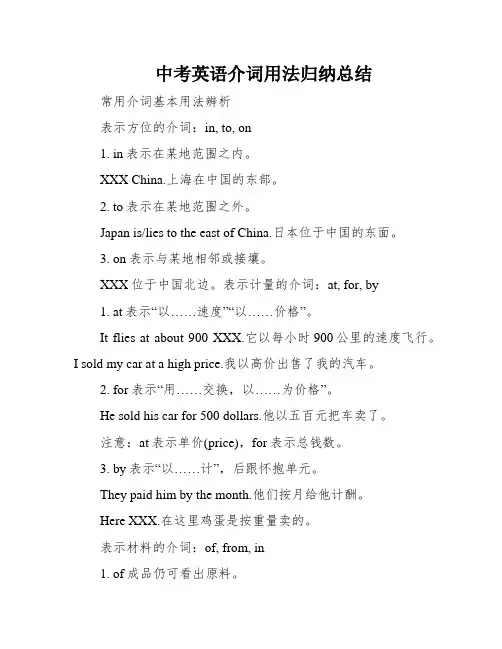
中考英语介词用法归纳总结常用介词基本用法辨析表示方位的介词:in, to, on1. in表示在某地范围之内。
XXX China.上海在中国的东部。
2. to表示在某地范围之外。
Japan is/lies to the east of China.日本位于中国的东面。
3. on表示与某地相邻或接壤。
XXX位于中国北边。
表示计量的介词:at, for, by1. at表示“以……速度”“以……价格”。
It flies at about 900 XXX.它以每小时900公里的速度飞行。
I sold my car at a high price.我以高价出售了我的汽车。
2. for表示“用……交换,以……为价格”。
He sold his car for 500 dollars.他以五百元把车卖了。
注意:at表示单价(price),for表示总钱数。
3. by表示“以……计”,后跟怀抱单元。
They paid him by the month.他们按月给他计酬。
Here XXX.在这里鸡蛋是按重量卖的。
表示材料的介词:of, from, in1. of成品仍可看出原料。
This box is made of paper.这个盒子是纸做的。
2. from成品已看不出原料。
Wine is made from grapes.葡萄酒是葡萄酿成的。
3. in表示用某种材料或语言。
Please fill in the form in pencil first.请先用铅笔填写这个表格。
XXX.他们用英语交谈。
表示工具或手腕的介词:by, with, on1. by用某种方式,多用于交通。
I went there by bus.我坐公共汽车去那儿。
2. with表示“用某种工具”。
XXX.他用石头把玻璃砸坏了。
留意:with表示用某种工具时,必需用冠词或物主代词。
3. on表示“以……方式”,多用于固定词组。
XXX.他们通过电话进行交谈。
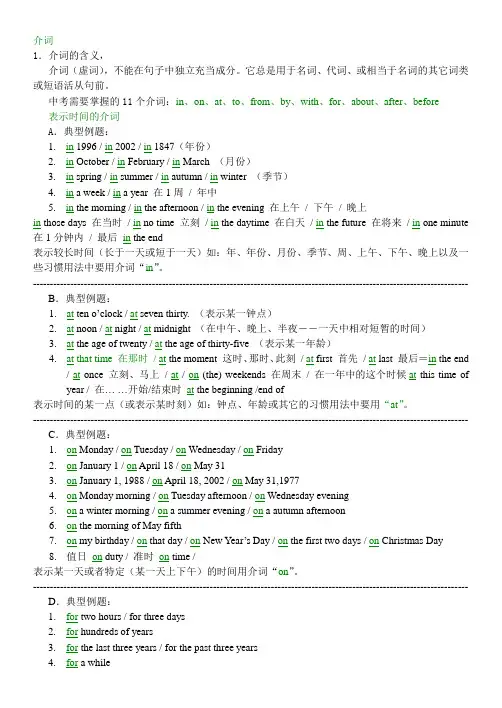
介词1.介词的含义,介词(虚词),不能在句子中独立充当成分。
它总是用于名词、代词、或相当于名词的其它词类或短语活从句前。
中考需要掌握的11个介词:in、on、at、to、from、by、with、for、about、after、before表示时间的介词A.典型例题:1.in 1996 / in 2002 / in 1847(年份)2.in October / in February / in March (月份)3.in spring / in summer / in autumn / in winter (季节)4.in a week / in a year 在1周/ 年中5.in the morning / in the afternoon / in the evening 在上午/ 下午/ 晚上in those days 在当时/ in no time 立刻/ in the daytime 在白天/ in the future 在将来/ in one minute 在1分钟内/ 最后in the end表示较长时间(长于一天或短于一天)如:年、年份、月份、季节、周、上午、下午、晚上以及一些习惯用法中要用介词“in”。
-------------------------------------------------------------------------------------------------------------------------------- B.典型例题:1.at ten o’clock / at seven thirty. (表示某一钟点)2.at noon / at night / at midnight (在中午、晚上、半夜――一天中相对短暂的时间)3.at the age of twenty / at the age of thirty-five (表示某一年龄)4.at that time 在那时/ at the moment 这时、那时、此刻/ at first 首先/ at last 最后=in the end/ at once 立刻、马上/ at / on (the) weekends 在周末/ 在一年中的这个时候at this time of year / 在……开始/结束时at the beginning /end of表示时间的某一点(或表示某时刻)如:钟点、年龄或其它的习惯用法中要用“at”。
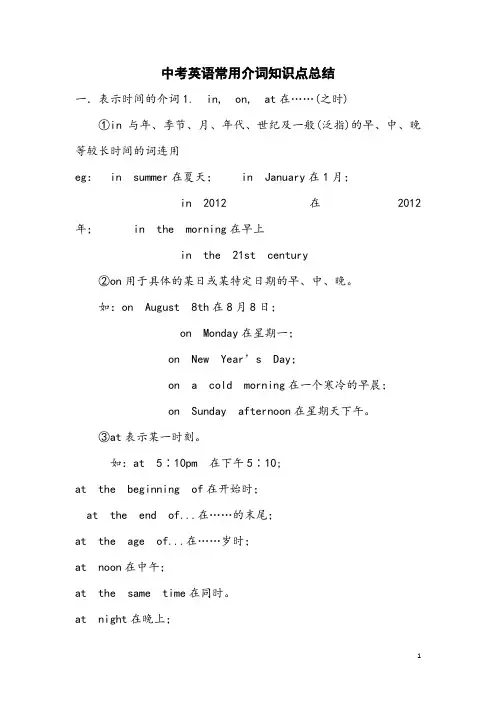
中考英语常用介词知识点总结一.表示时间的介词1. in, on, at在……(之时)①in与年、季节、月、年代、世纪及一般(泛指)的早、中、晚等较长时间的词连用eg:in summer在夏天;in January在1月;in 2012 在2012年;in the morning在早上in the 21st century②on用于具体的某日或某特定日期的早、中、晚。
如:on August 8th在8月8日;on Monday在星期一;on New Year’s Day;on a cold morning在一个寒冷的早晨;on Sunday afternoon在星期天下午。
③at表示某一时刻。
如:at 5∶10pm 在下午5∶10;at the beginning of在开始时;at the end of...在……的末尾;at the age of...在……岁时;at noon在中午;at the same time在同时。
at night在晚上;2. in, after 在……之后“in +时间段”用于将来时之中;“after+时间段”用于过去时态之中;“after+时间点”既可用于将来时也可用于过去时。
如:Jim will go to Beijing in five days.吉姆五天后会去北京。
Jim went to Beijing after five days.五天后,吉姆去了北京。
Jim will go to Beijing after five o’clock.吉姆会在五点钟后去北京。
3. for, sincefor可以指过去、现在或将来,着重说明“多久”,后面接时间段。
since意为“自从……起”,多与完成时连用,后面接时间点或从句。
since引导的从句通常为一般过去时。
如:He has lived here for 2 weeks./ He has lived here since 2 weeks ago.It’s five years since he left school.4. after, behind 在……之后after主要用于表示时间;behind主要用于表示位置。
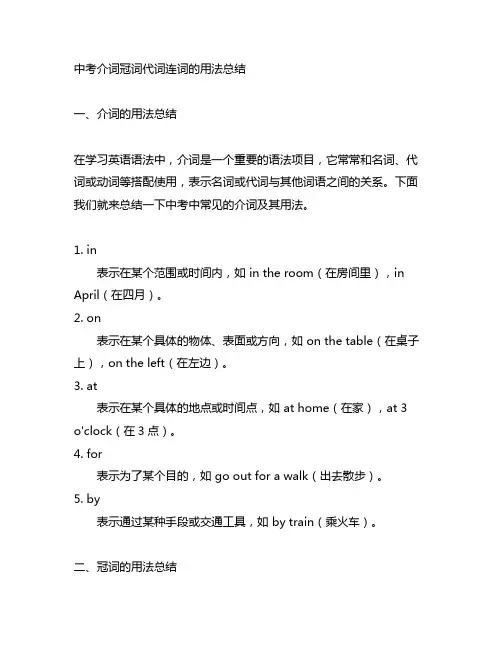
中考介词冠词代词连词的用法总结一、介词的用法总结在学习英语语法中,介词是一个重要的语法项目,它常常和名词、代词或动词等搭配使用,表示名词或代词与其他词语之间的关系。
下面我们就来总结一下中考中常见的介词及其用法。
1. in表示在某个范围或时间内,如 in the room(在房间里),in April(在四月)。
2. on表示在某个具体的物体、表面或方向,如 on the table(在桌子上),on the left(在左边)。
3. at表示在某个具体的地点或时间点,如 at home(在家),at 3 o'clock(在3点)。
4. for表示为了某个目的,如 go out for a walk(出去散步)。
5. by表示通过某种手段或交通工具,如 by train(乘火车)。
二、冠词的用法总结冠词是英语中一个比较难点的语法项目,分为定冠词“the”和不定冠词“a/an”。
下面我们来总结一下中考中常见的冠词用法。
1. 定冠词“the”表示特指,如 the sun(太阳)。
2. 不定冠词“a/an”表示泛指,如 a book(一本书)。
三、代词的用法总结代词是用来代替名词的词语,它能够减少重复,使语言更加简洁。
在中考中,代词也是一个重要的语法项目。
下面我们来总结一下中考中常见的代词及其用法。
1. 人称代词主格:I(我)、you(你)、he(他)、she(她)、it(它)、we(我们)、you(你们)、they(他们)。
宾格:me(我)、you(你)、him(他)、her(她)、it (它)、us(我们)、you(你们)、them(他们)。
形容词性:my/mine(我的)、your/yours(你的)、his(他的)、her/hers(她的)、its(它的)、our/ours(我们的)、your/yours(你们的)、their/theirs(他们的)。
2. 物主代词指代名词所有物,如 mine(我的)、yours(你的)、his(他的)、hers(她的)、its(它的)、ours(我们的)、yours(你们的)、theirs(他们的)。

中考英语常考易混易错重要知识点、语法讲解整理Mr Sun一、介词in/on/at区别1、在泛指在早上、在下午、在晚上、在夜间,用in如:in the morning在早上in the afternoon在下午in the evening在晚上in the night二at night在夜间2、在morning/afternoon/evening/night有定语修饰的时候,要用介词on如:on a cold morning(cold是前置定语)在一个寒冷的早晨On the morning of May1st(of May1"是后置定语)在五月一日的上午3、在某年、某月、某年某月用in,在具体的某一天、在星期儿用。
n,在具体的某一时刻、在中午用at如:in2018在2018年,in January在1月,in February,2018在2018年2月,on the first在1 号,on October1st,2018在2018年10月1号,on/at weekends=on/at the weekend在周末,on Monday在星期一,at six在六点,on weekdays在平日,at noon在中午二、used to do sth.用法1、used to do sth.肯定句式used to do sth.“过去常常做某事/以前经常做某事/曾经”,暗示现在不这样做了。
to为不定式符号,后接动词原形。
如:I used to be a worker,but now I set up a company and become a businessman.It曾经是一名工人,但是现在我成立了公司,成为了一名商人。
(现在不是工人了)The boy used to play soccer after school.这个男孩过去常常放学后踢足球。
(现在不踢了)2、used to do sth.否定句式iin+usedift/used not/didn't use+to do如:He didn't use to study luird=He usedn't to study hard.=He used not to study hard.他过去常常不努力学习。
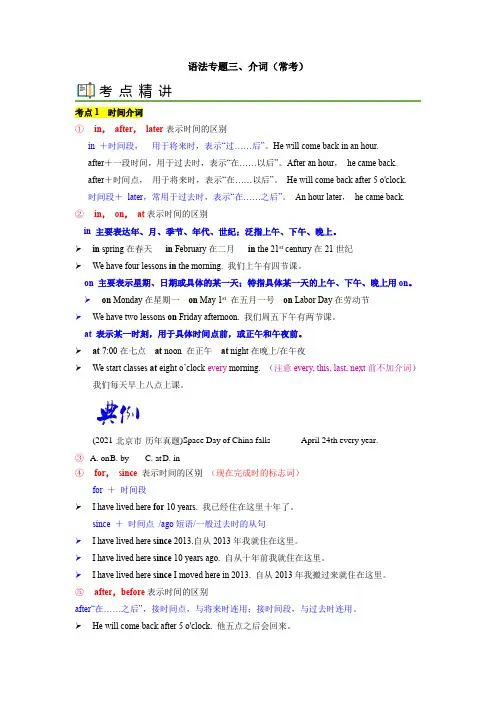
语法专题三、介词(常考)考点1 时间介词①in,after,later表示时间的区别in +时间段,用于将来时,表示“过……后”。
He will come back in an hour.after+一段时间,用于过去时,表示“在……以后”。
After an hour,he came back.after+时间点,用于将来时,表示“在……以后”。
He will come back after 5 o'clock.时间段+later,常用于过去时,表示“在……之后”。
An hour later,he came back.②in,on,at表示时间的区别in 主要表达年、月、季节、年代、世纪;泛指上午、下午、晚上。
➢in spring在春天in February在二月in the 21st century在21世纪➢We have four lessons in the morning. 我们上午有四节课。
on 主要表示星期、日期或具体的某一天;特指具体某一天的上午、下午、晚上用on。
➢on Monday在星期一on May 1st在五月一号on Labor Day在劳动节➢We have two lessons on Friday afternoon. 我们周五下午有两节课。
at 表示某一时刻,用于具体时间点前,或正午和午夜前。
➢at 7:00在七点at noon 在正午at night在晚上/在午夜➢We start classes at eight o’clock every morning. (注意every, this, last, next前不加介词)我们每天早上八点上课。
(2021·北京市·历年真题)Space Day of China falls ______ April 24th every year.③ A. on B. by C. at D. in④for,since 表示时间的区别(现在完成时的标志词)for +时间段➢I have lived here for 10 years. 我已经住在这里十年了。
介词in的用法及例子介词是连接名词、代词或动词与其他词语的一种虚词,它在句子中通常用来表示名词或代词与其他成分之间的关系。
在英语中,介词是一类非常常见且重要的词性,它们具有多种用法和含义。
其中,“in”是一种常见的介词,下面将介绍其用法及相应的例子。
1.表示位置或方位:介词”in”常用来表示某物所处的位置或方位。
•The cat is sleeping in the basket.•The books are in the bookshelf.2.表示时间:介词”in”也可表示某一特定时间段或时间点。
•The meeting will start at 9 o’clock in the morning.•She was born in July.3.表示状态或条件:“in”还可以表示特定的状态或条件。
•She is in a hurry.•The shoes are in good condition.4.表示目的或用途:有时”in”被用来表示某事物的目的或用途。
•She bought a gift to give in her friend’s birthday party.•The students are working hard in order to pass the exam.5.表示领域或范围:介词”in”还可以表示某种领域或范围。
•He is an expert in computer programming.•There are many opportunities in the field of healthcare.6.表示传统、制度或规定:有时,“in”被用来表示某种传统、制度或规定。
•We celebrate Thanksgiving in November.•It is important to follow the rules in this company.总之,介词”in”在英语中具有多种用法,上述仅是其中的一部分。
中考英语介词用法归纳总结1.在表示位置的介词:- in:用于表示在一些具体的地点或位置内,如in the bedroom (在卧室里)、in the park(在公园里)。
- at:用于表示在一些具体的地点或位置上,如at the bus stop (在公交车站)、at the table(在桌子旁边)。
- on:用于表示在一些具体的平面或表面上,如on the ground(在地上)、on the desk(在桌子上)。
- under:用于表示在一些物体的下方,如under the tree(在树下)、under the bed(在床底下)。
- over:用于表示在一些物体的上方,如over the bridge(在桥上)、over the head(在头顶上)。
2.在表示时间的介词:- at:用于表示具体的时间点,如at 8 o'clock(在8点)、at noon(在中午)。
- in:用于表示较长的时间段,如in the morning(在上午)、in June(在6月份)。
- on:用于表示具体的其中一天,如on Sunday(在周日)、on New Year's Day(在元旦)。
- during:用于表示在一些时间段内,如during the summer vacation(在暑假期间)。
3.在表示目的的介词:- for:用于表示为了一些目的,如study hard for the exam(为了考试而努力学习)。
- to:用于表示给人或物,如give a present to my friend(给我朋友送礼物)。
4.在表示原因的介词:- because of:用于表示因为一些原因,如because of the heavy rain(因为大雨)。
- due to:用于表示由于一些原因,如the delay is due to the bad weather(延误是因为坏天气)。
2020中考英语精华知识点全汇总!英语精华知识点全汇总一.中考考点——词组1. after, in这两个介词都可以表示“……(时间)以后”的意思after以过去为起点,表示过去一段时间之后,常用于过去时态的句子中?如:She went after three days.她是三天以后走的in以现在为起点,表将来一段时间以后,常用于将来时态的句子中如:She will go in three days.她三天以后要走2. how long, how often, how soonhow long指多长时间,主要用来对一段时间(如three days, four weeks等)提问?如:Howlong ago was it?这是多久前的事了?how often指每隔多久,主要用来对频率副词或状语(如once a week等)提问?如:—Howoften does he come here?—Once a month.他(每隔)多久来一次?每月一次。
how soon指再过多久,首要用来对表示将来的一段时间(in an hour, in two weeks等)提问?如:How soon can you come?你多快能赶来?3. few, a few, little, a little, several, somefew和XXX的意思是否定的,表示“很少”或“几乎没有”;而a few和a little的意思是肯定的,表示“有一些,有一点儿”few和a few润饰可数名词;XXX和a little润饰不成数名词several用于修饰可数名词,语意比a few和some更肯定,含有“好几个”的意思some可修饰可数名词,也可修饰不可数名词,从数量上说,它有时相当于a few或a little,有时指更多一些的数量4. the other, anotherthe other指两个人或事物中的“另一个”,表示特指?如:XXX> another着重于不定数目中的“另外一个”,表示泛指,所以常用来指至少三个中的一个?如:XXX.她已经拿了我的另外一本书5. spend, take, cost, payspend的宾语通常是时间?金钱?在主动语态中,句子的主语必须是人,而且后面不能用动词不定式做它的宾语?如:XXX.她把整个晚上用来读书take常常用来指“花费”时间,句子的主语通常是表示事物的词语?如:How long will this job take you?你做这项工作要花多长时间?cost指花费时间?金钱或力气等,只能用表示事物的词做主语,并且不能用于被动语态?如:How much does the jacket cost?这件夹克多少钱?pay主要指主语(某人)买某物(或为某事)付多少钱(给某人)?如:I pay for XXX.我按月支付租金6. among, betweenbetween的意思是“在……中间,在……之间”,一般指在两者之间?如:There XXX windows.在两扇窗户之间有一张桌子。
时间介词in的用法在英语中,时间介词”in”是一个常用且多功能的介词,它在不同情境下可以表示各种时间概念。
正确使用”in”这个介词可以帮助我们准确表达时间概念,下面我们来探讨一下”in”的用法及其相关例句。
首先,“in”可以用来表示某一时刻、某一特定时间段内的时间。
比如,我们可以说:- I have an appointment with the doctor in the afternoon. - The package is scheduled to arrive in two days. - She will start her new job in September.除了表示特定的时刻或时间段,“in”还可以表示一段时间的未来或过去。
例如: - The concert will take place in a week. - They plan to travel to Europe in the summer. - He learned to play the piano in his youth.另外,“in”还可以用来表示一段时间的延续。
比如: - I will finish the project in a couple of hours. - We will know the result in a few days. - The shop will close in ten minutes.此外,“in”还可以用来表示一种大致的时间范围或时期。
例如: - I will retire in about ten years. - He was born in the 1980s. - They will move to a new house in the near future.除了以上提到的用法外,“in”还可以用在其他情况下,比如表示某个月、季节、年龄、年代等。
例如: - Our anniversary is in May. - The flowers bloom in spring. - She got married in her twenties. - The film is set in the 1960s.总的来说,“in”作为一个时间介词在英语中使用频率很高,掌握其用法可以帮助我们更准确地表达时间概念。